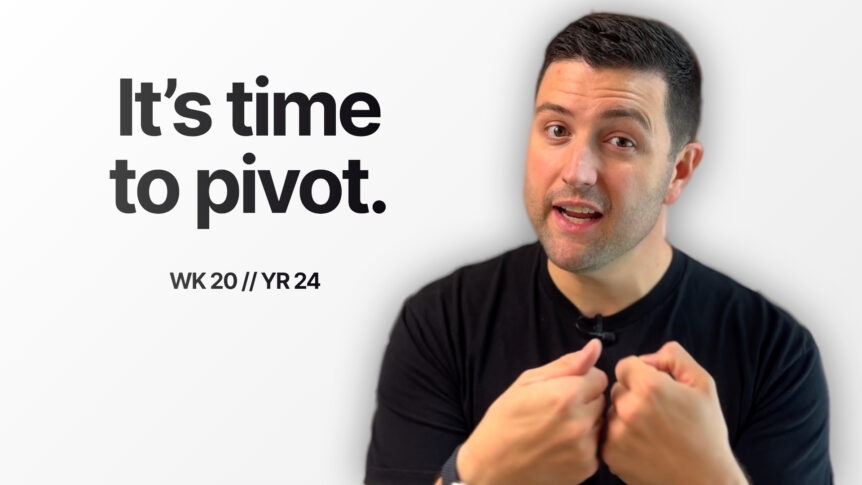Whew, it’s been a while since I’ve posted on YouTube!
455 days to be exact.
No, I didn’t join the circus, and I wasn’t stranded on a desert island. Things just got busy at home and around the church and something had to give—and that thing was YouTube.
When I first started on YouTube, I was publishing videos twice a week and I loved it. It loved the research, the filming, and even the editing. I loved it all—and I still do! But, things were different four years ago.
In the last four years, my kids have grown from babies and a toddler to preschoolers and first a first grader and my wife’s responsibilities at her work have also greatly increased because she’s an absolute rock star. And in the last four years, Antioch has grown from one hundred to one thousand and from three staff members to ten.
I say all of that to say that my responsibilities changed quite a bit and therefore my life had to pivot. So when things change and you know you need to make a life pivot, how do you know which direction to go?
It think it’s one thing—priorities.
I know we’ve all heard many people over the years talk about priorities, but I want to talk about it in what I hope is a different way that I think may take it from tired cliche to true clarity.
You’ve probably heard it said that we should write out the major areas of our life and then rank them in order from most important to least important and then make decisions according to that metric. And that’s all true, but the problem with that is that it leaves out a lot of nuance and fuzziness. I mean, things just aren’t that clear-cut. But, I’m getting ahead of myself there.
We do need to categorize the big areas of our lives and then rank them in importance—things like family, God, work, etc. With this list, we then put them in a proper order and then make adjustments accordingly in life.
Jesus even used “priority” language in His Sermon on the Mount. He told people who had real concerns about food and clothing to, yes, seek those things, but not seek them first. He said we should “…seek first the kingdom of God and his righteousness, and all these things”—the need to provide for yourself food and clothing, specifically—”will be provided for you.” (Matthew 6:33)
So if you’re a Christian, God has to be your first thing—that’s your #1 priority.
But even in what Jesus said there, we see a little nuance. He said to seek God first, “and all these things will be provided…” See how there’s a connection there between the first priority and the lower priorities? Life isn’t so easily separated into neat containers. Instead, things are connected to one another.
Let’s move on to the next two so I can illustrate: God, then Family, then Work.
That shouldn’t be a very controversial order, this is pretty standard for Christians. Here are the connections… Putting God first bleeds into how we treat our family and our work ethic—#1 connects to #2 and #3. But you would think that a higher priority would affect the lower priorities.
But it also works the other way around. If we want to prioritize our family, we must make sure they are provided for—so family at #2 can’t completely crush #3 or #2 also falls apart. And if you send off your family and quit your job so you could read your Bible all day—that wouldn’t work either—you would actually dishonor God by doing so.
There must be an appropriate balance here.
We seek God first, and that influences our family and our work.
We love our family dearly, and that honors God and gives our work purpose.
We work hard at work, that also honors God and provides for our family.
They work with each other—and should complement each other.
And that works for your other priorities as well—your volunteering, your hobbies, your recreation, etc.
I think we all get that they should complement each other to give us a good, God-honoring life. Where things get hard is when they start conflicting.
- Maybe God points out something unethical at work—that’s a conflict.
- Maybe the boss is keeping you in the office too long, and your family suffers—that’s a conflict.
- Maybe the husband wants you to binge a TV show late every night, affecting work and your time with God—that’s a conflict.
So, how do we deal with these conflicts?
First, know that you will always have to make adjustments and tweaks in your life. You’ll never strike such a perfect balance that you’ll never have to make a course correction.
Second, appropriate balance means different things in different seasons. The way I prioritize my family is different now that my kids are seven, five, and four than it was when they were four, two, and one, and it will be different when they are twenty-one, nineteen, and eighteen—we have to rebalance. Likewise, during times of a family crisis, they’ll need you a lot more—and you’ll have to rebalance quickly. And they need you a lot less when they’re with their grandparents for a week. You see where I’m going.
And third, balance isn’t literal; it’s relative. We have twenty-four hours in a day. If we take out eight of that for sleep, that’s sixteen hours. If we divide that by three to split our time between God, family, and work, we would spend five hours and twenty minutes on each of them per day—and that’s not counting our commute, our showering, our meal prep, and all the other things we have to do. That wouldn’t work.
No, balance is relative. Most of us spend eight hours at work, and let’s give ourselves a generous eight hours of sleep—that leaves us with just eight hours left per day for God and family—our #1 and #2 priorities. How do we square this?
Well, with God, we spend 15, 30, or 45 minutes with Him in the morning before we start our day—but we don’t end it there. We walk with God throughout our day. We have an ongoing conversation with God in our minds through prayer. Maybe we listen to worship music at the gym or a Christian podcast on our commute. We have a focused time with God early and then a life that walks with Him all day.
With our family, we spend time in the morning (if we’re lucky) and then time in the evening together. And yes, that time is brief during the workweek. But then, we have a weekend with no work and lots of family time. Are the days perfectly balanced? No, but we make weekends count. We make sure we get enough quantity time so that we end up having some quality time.
Priority isn’t about its duration of time but about its significance in life. Do those things often correlate? Yes—but sometimes they don’t, too.
Knowing our priorities isn’t strictly about delegating our time but helping decide a winner when there’s a prolonged or significant conflict between things we value. It’s okay when things are temporarily out-of-whack, but if it goes on too long, that’s when life gets off track.
Let me give you an example…
I’ve loved playing video games as a hobby since I was a kid and during portions of my life, they took up a significant amount of time—not saying that’s good, but it is the truth. As family and work took up more and more of my capacity, I had to give something up—that thing was video games. To use a competition analogy, video games were on the bubble—the lowest thing on my list—and then it was bumped off.
When it first happens, you hate it. But then you realize that you only have so much capacity—you can only do so much—and you made the right choice. That was a strategic pivot—a decision made based on what’s truly most important.
Can I tell you something, though?
Strategic pivots aren’t forever. They are for the moments when capacity is maxed out—but that’s not all your time for the rest of your life. When you make a strategic pivot, you’re not saying no forever, you’re saying, “Not now, but maybe later.”
Do I play video games like I’m twenty-three with no kids? Nope. Do I get to spend a little family time playing video games with my son after his homework? Yea, I do. And it’s a lot of fun. Life changes, and we have to change with it, but that doesn’t mean it’s forever.
And that brings me back to the start. 455 days ago, I had to make a strategic pivot away from YouTube to focus on things at home and at church. Now, I think I’m at a place where I can pivot back to YouTube. I really missed it—it is a really rewarding hobby for me.
But I can’t do YouTube like it’s 2020, doing two videos a week—I need to do YouTube like it’s 2024 and my life’s responsibilities are what they are.
My plan is to do something like this a few times a month and then a well-researched, well-produced, in-depth video and post once a month.
We’ll see if that’s a good balance for me—I suspect I’ll need to do a little tweaking to get it just right.
Have you ever had to make a strategic pivot? I’d love to hear about it in the comments below. I’d also love to hear if you were ever able to pivot back to something you had to previously give up.

